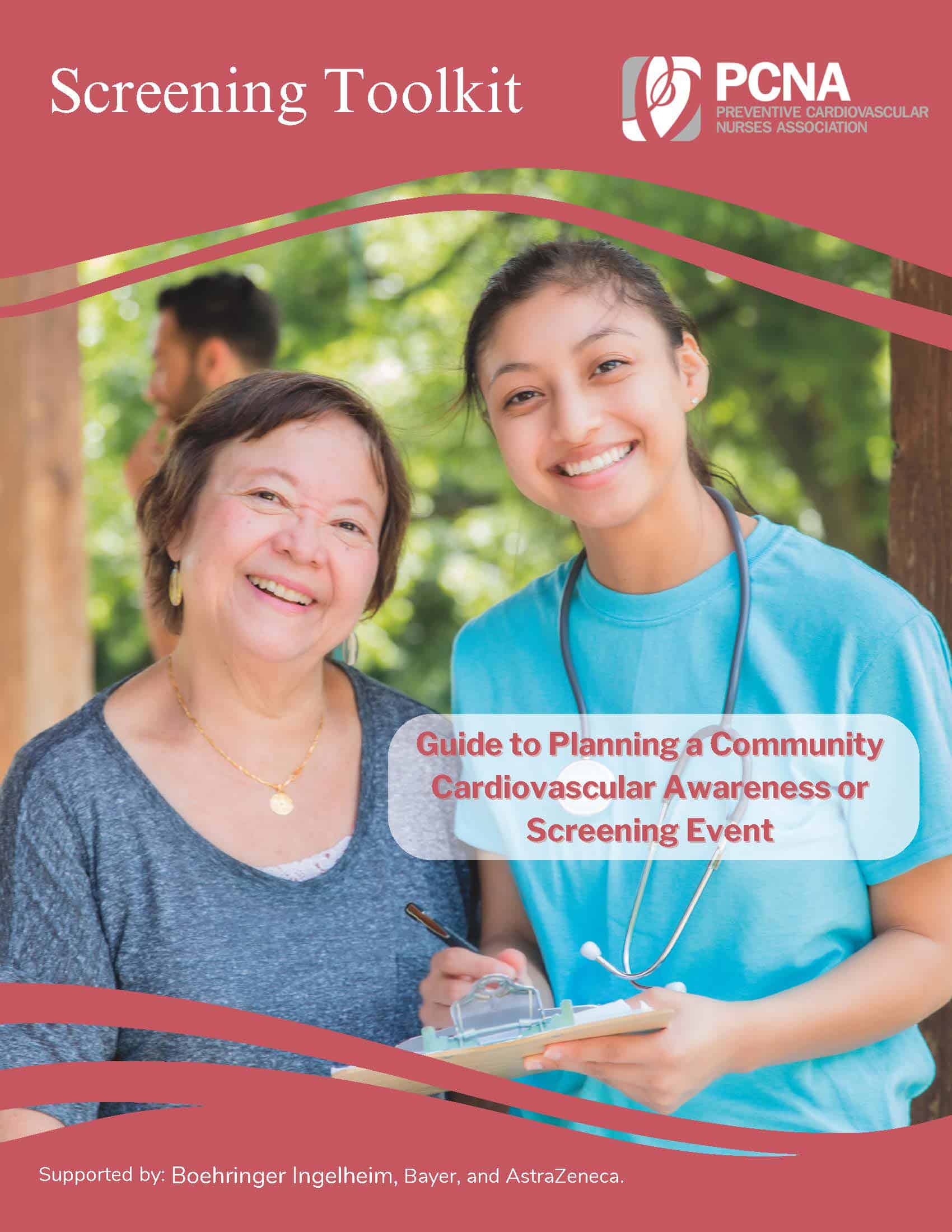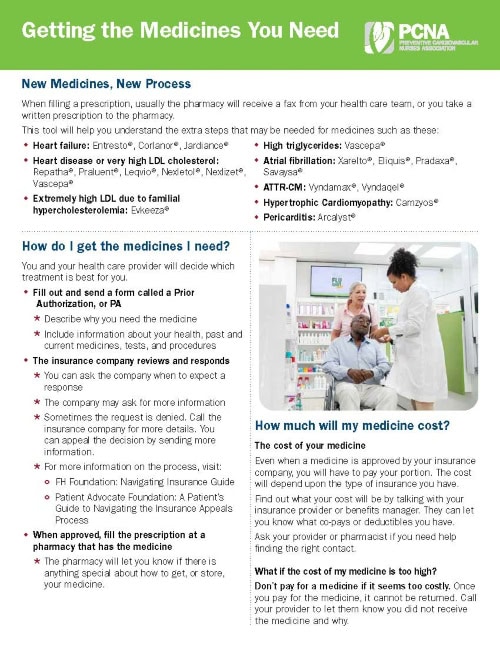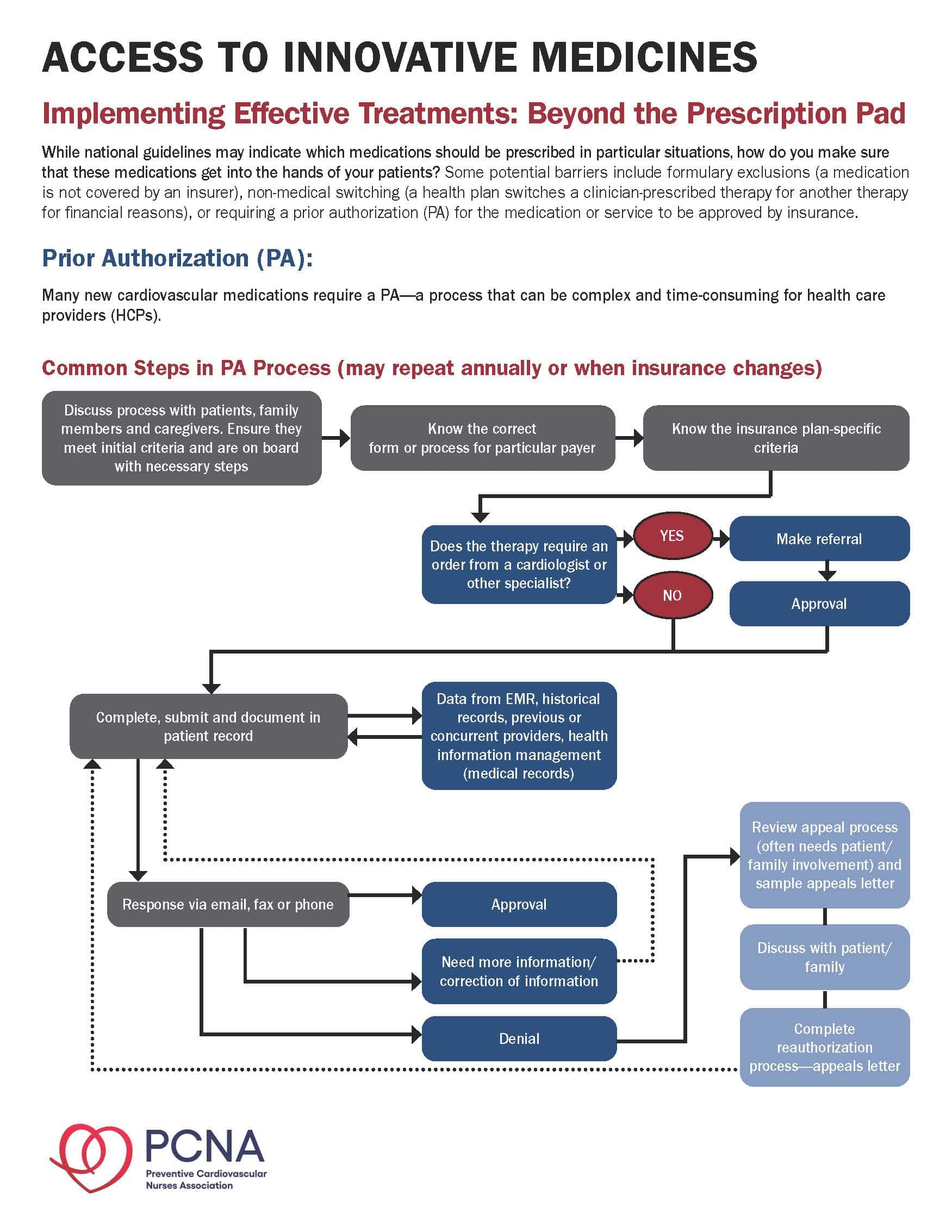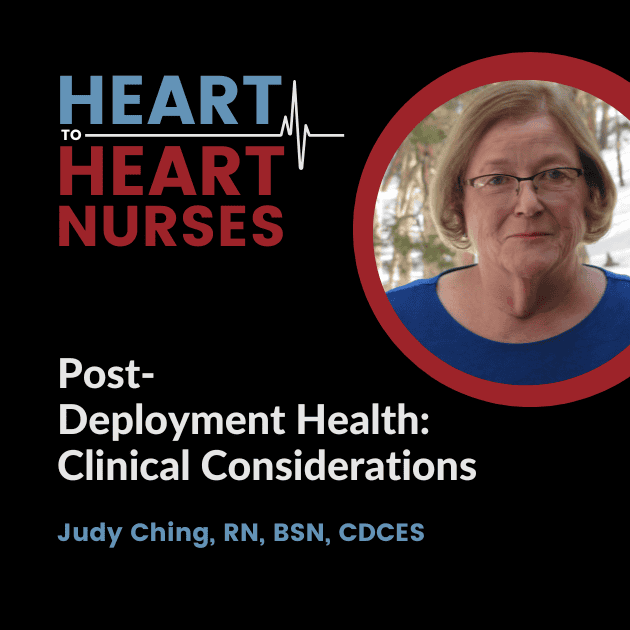Individuals returning from deployment to their hometown require clinicians who understand the special factors that may influence their health, such as long-term exposures to stress and chemicals, unhealthy eating, and more. Guest Judy Ching, RN, BSN, CDCES, describes these considerations and the critical importance of correct documentation to ensure long-term care through the VA and other sources.
Episode Resources
- 2024 Burn Pit (PACT Act) Bill (PDF)
Welcome to Heart to Heart Nurses, brought to you by the Preventive Cardiovascular Nurses Association. PCNA’s mission is to promote nurses as leaders in cardiovascular disease prevention and management.
Geralyn Warfield (host): I’d like to welcome our audience to today’s episode of Heart to Heart Nurses, where we have the great pleasure of talking with Judy Ching. Judy, could you introduce yourself to our audience please?
Judy Ching (guest): Hi. I am a registered nurse for 45 years. Started out as a diploma nurse and then got my BSN. And I have mainly worked in cardiac, started out in cardiac rehab, pulmonary rehab, and diabetes.
And my husband was active-duty military. And depending on where we were stationed was whether I did cardiac rehab, pulmonary rehab, or diabetes. And in the last 10 to 12 years, it’s been all [00:01:00] diabetes and no longer doing cardiac rehab.
Geralyn Warfield (host): Well, we’re so grateful to you for spending your time with us today. And one of the reasons that we wanted to talk with you is because of your great expertise in working with military families.
Now, not everybody who is listening might recognize that some of their patients have that background where they come from a military family, maybe they’ve moved around quite a lot, but there are some very special health considerations for these individuals. Could you talk a little bit more about what that’s like?
Judy Ching (guest): Well, especially with the active duty and the National Guard, that’s where the big problem is, is with the National Guard. Active-duty people, when they come back from deployment, they come back to a base or a post. And there are doctors, providers who are specialized in taking care of them and documenting everything about their deployment.
When you’re a National Guard and you’re going back home, there could only be [00:02:00] three, a dozen, people coming back to a town. And so, they’re not getting the specific care and documentation that they need for follow-up so that they get good care at the VA and other places afterwards.
When I think about it, people are deployed for six months, nine months, 12 months, at a time. And there are a lot of people, especially in the Army or in the Marines who are deployed 6, 8, 12, times in their career. And so that’s a lot of issues that can come up from that.
And so, it’s important to document who was deployed, when they were deployed, where were they deployed, so that that information can help them with the VA for care later.
Geralyn Warfield (host): Well, I very much appreciate the fact that you have a very special view of these individuals that have come back because you’ve been working with [00:03:00] these individuals for a while. And there are some, we think as clinicians that we have hard jobs and many of us do, working long hours, odd shifts and those kinds of things.
But what other special considerations do we need to keep in mind as we’re dealing with these individuals who have come back from deployment?
Judy Ching (guest): Well, I’m thinking more of the more recent deployments like to Iraq. Afghanistan. These are individuals who are on 24/7. They really have no downtime. And you think about that for six months or nine months at a time—being ‘on’, and what that’s doing to their cortisol levels and, therefore, affecting their heart.
And then you think about what are they eating? It’s not like they have the mess tents like from the old M*A*S*H TV show. They’re eating MREs—meals ready to eat. And those meals can be anywhere from 1200 to 1500 calories in one [00:04:00] meal. And these are meals that are ready to go, full of salt. And they don’t get heated up. They eat ’em cold.
The good news is we’re not giving out cigarettes anymore in the MREs like we did way back in the Korean and Vietnam era.
But the other problem is these individuals, instead of drinking water, are doing energy drinks. And I’m not talking one energy drink a day. I’m talking multiple a day. So that, on top of the MREs and what that’s doing to their heart, the sodium, the high calorie, the high fat. I think the fat content in one of those MREs is like 40%.
Geralyn Warfield (host): Wow.
Judy Ching (guest): So that has a lot of health implications on that, just on what they’re eating and drinking.
And that’s not taking into consideration their living and what they can’t do. They may be restricted to areas. They can’t exercise, or [00:05:00] a lot of them are over-exercising just to keep their minds going and their body going.
Geralyn Warfield (host): And then there’s the added layer of what’s happening in these areas with exposure to chemicals and those types of things. Could you talk a little bit more about that?
Judy Ching (guest): Well, it’s been in the press a lot lately. It’s the burn pit bill that finally came through. Burn pits have been around since the Civil War.
Okay. Living in a tent and then I have to burn my trash. It’s right there next to me, so I’m breathing it in.
But the problem today is our burn pits aren’t just food and things like that. It’s chemicals that are being burned. It’s electronics that are being burned. In Iraq, you think about they were setting all the oil wells on fire.
So, people are breathing that in. And so, think of smog in LA. And multiply that. And that’s just having long-term health complications. [00:06:00]
Geralyn Warfield (host): We’re having a fascinating conversation with Judy Ching about being the best providers for our individuals who are post-deployment and being seen in practice. We’re going to take a quick break and we will be right back.
Geralyn Warfield (host): We’re back with our conversation with Judy Ching. And Judy, there are a couple other considerations for these patients. And I’m hoping you could talk a little bit about live vaccines.
Judy Ching (guest): So, when somebody is getting ready to be deployed, we’re trying to spiff them up as much as we can, and we want to make sure they’ve had all of their vaccines. And so, live vaccines like anthrax, okay, is a series of shots that they get. And they’re timed. You get your first shot, then a month later you get another shot, and then six months later you get another shot.
And the problem is, if you don’t do it on the right timeline, then you get to start it all over [00:07:00] again.
And so, there’s a lot of soldiers—and I’m just going to use generic, the word ‘soldiers’ to cover all of the military—that have gotten anthrax vaccines multiple, multiple times. And so, what does that do to their body long term? We don’t know, okay?
Soldiers are not allowed to turn down vaccines. So, it’s basically, prior to being deployed, they’ll bring in a whole unit and we’ll look at their cards and see what they need. So, somebody could be getting 3, 4, 5 vaccine shots prior to deployment, smallpox, whatever. And so, I mean, you’ve got these big, tall soldiers and you’ve got nurses on both sides giving two or three shots in both arms at the same time, on the same day. Not ideal, but it works. And so, we have to think about that when people are coming back from deployment, and [00:08:00] problems.
One of the things we’re thinking about is, when the Vietnam soldiers and also the Korean soldiers, they were exposed to Agent Orange. And look at how long it’s taken us to treat those people. And the multitude of problems: the cardiac problems, the diabetes, the things like that, the Parkinson’s disease, that all come from Agent Orange.
And those are the easy ones. That’s not the cancer that also came from Agent Orange.
From Iraq and Afghanistan, we’re getting autoimmune diseases as a result. We had one brigade that came back and there were 12 new autoimmune diseases. Now, three of them were Type 1 Diabetes, there was Raynaud’s, there was MS. So, we’re not talking small things that are coming back.
So that’s what’s going to come back to us in another 10 to 20 years when people put together–probably through the VA, but again through the local places that [00:09:00] all these people are coming back with autoimmune diseases that may not show up for 10 or 20 years downstream.
And that’s why the documentation is important for that. To say, “Yes, I was deployed, I was there. This is what I was exposed to.”
Geralyn Warfield (host): We’ve been talking a lot about the physical manifestations or the physical issues that our military personnel are faced with, but there’s another really important aspect, and that is the mental health aspect of their healthcare. Could you talk a little bit more about that please?
Judy Ching (guest): PTSD is a real thing. At least we know what it is now. It’s not what we labeled it way back in World War I and World War II when people got punished. And it was really PTSD that was going on.
Again, mental health is an issue for the whole United States, for the whole world, and we don’t have enough care providers for that.
And it’s really hard to adjust, coming back from deployment [00:10:00] where you’re on 24/7. And now you’re home and you’ve got to kind of cool it down.
And it’s very difficult. And the more deployments you have, the harder it is to readjust.
And I mean, they hear a car backfire, and they think it’s, you know, gunshots or whatever. So, it’s something that they carry with them. So, it’s something that needs to be evaluated, needs to be treated.
The VA is doing a much, much better job, but we all need to be doing a better job of evaluating it. And a lot of people coming back, I don’t want to say don’t want to admit it, but it’s hard to admit when you’re having issues with your mental health. And a lot of people still perceive it, and it has a stigma attached to it. And it shouldn’t. We really need to address it.
Geralyn Warfield (host): Judy, we have had such an amazing array of topics that we’ve covered today. [00:11:00] Is there any one thing that you would like our clinicians that are listening to this episode to take away?
Judy Ching (guest): Really, just look at the whole individual. Even if they’re coming in for appendicitis or something else like that. Look at the whole individual.
Really look at the physical and the mental health of our military that are coming back.
Geralyn Warfield (host): We are so incredibly grateful to you for taking time today to share with us your experience and the experience that our military personnel are having, both at home and before they come home. And the importance of documentation, the importance of understanding that these individuals need additional care and support beyond some of the other patients that we might be seeing, but that everybody’s mental health, as well, is important to us all.
Judy Ching (guest): Thank you for this opportunity.
Geralyn Warfield (host): You’re very welcome. This is Geralyn Warfield, your host, and we will see you soon. [00:12:00]
Thank you for listening to Heart to Heart Nurses. We invite you to visit pcna.net for clinical resources, continuing education, and much more.
Topics
- Health Equity
Published on
May 22, 2024
Listen on:
RN, BSN, CDCES
Related Resources










